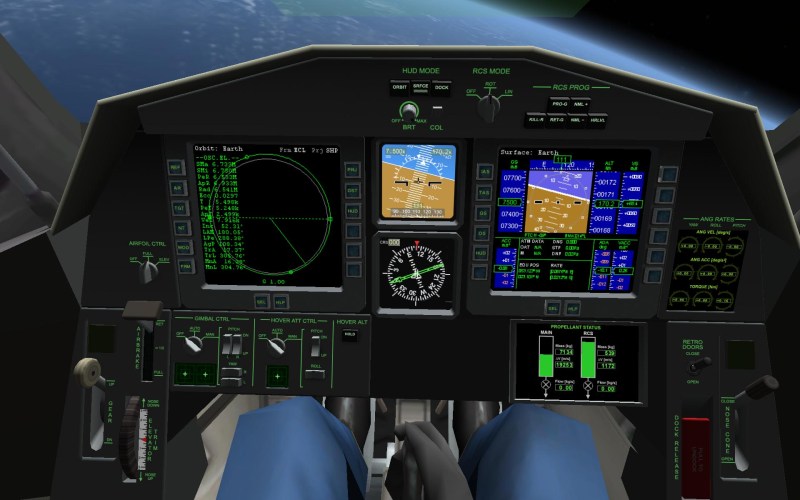We always have it on our list to learn more about Orbiter. If you haven’t seen it, it is a hyperrealistic space simulator. Granted, you can put it in an easy mode, but its real strength is you can very accurately model spacecraft like the Space Shuttle and have very realistic controls. In order to spur development, the program is now open source.
We think this is interesting for two reasons. First, if you ever wanted to contribute into a project of this scope, here’s your chance. You might not want to write a full-blow space simulator but you might have something to add. However, open source also means you can see how the program works and either reuse it in your own open source projects or just simply learn from the techniques.
As an example, we know lots of people make replica DSKY devices. How cool would it be to interface one to Orbiter? Or build out an entire Shuttle cockpit? We wish Orbiter was cross-platform but we hear it will run under WINE.
If you haven’t run into Orbiter before, here’s the description from their FAQ:
Orbiter is a real-time 3D space flight simulator for the Windows PC. The concept is similar to traditional flight simulator software, but you are not limited to atmospheric flight. Orbiter allows you to experience manned and unmanned space flight missions from the pilot’s perspective. Take control from launch to orbtial insertion, rendezvous with space stations, deploy and recapture satellites, and re-enter and land on a planetary surface. The playground is our solar system, and you can even execute missions to the moon or other planets. (Time compression is available to shorten long cruise phases.) Orbiter accurately models the physics of spaceflight, which makes it possible to either recreate historic missions, or use it as a sandbox for futuristic spacecraft concepts.
Don’t forget when you build a great project around this to drop us a note.
















Now that its open source, someone could port it to Linux or other platforms if they wanted to :)
MIT License too! That should make it easy
+1
Am I the only thinking of the classic line in Spaceballs, when I read
“You might not want to write a full-blow space simulator but you might have something to add”
?
“Are we stopped?”
its like were reading a blog made by nerds, for nerds.
Could you post a link to the main Orbiter page? If there is one? The forum pages only link to the forum. The help page on the forum is not very good, some of the download links are dead, and the FAQ is empty.
That would be great, thanks.
Ok. Found the wiki. It’s okay I suppose.
https://www.orbiterwiki.org/wiki/Main_Page
Still missing a few things you might expect to see.
http://orbit.medphys.ucl.ac.uk/
1. So where is the binary to run or install? The GitHub repo seems source-only (compile-hell ensues). I may be missing something in this HaD post, but I can’t get from the post to the actual useful binary executable.
2. Here’s a review video of this thing ca. Sep 1, 2016, which is probably the same version going “open” referenced in this post:
* Orbiter 2016 – A Less Kerbal Space Sim [17:38]
https://www.youtube.com/watch?v=lC-0taniRWk
https://www.youtube.com/watch?v=lC-0taniRWk
http://orbit.medphys.ucl.ac.uk/
I was only thinking the other day how I wish Flight Simulator would come to the Mac but stuff that, I need Space Simulator
http://orbit.medphys.ucl.ac.uk/ For those of you looking
Hello
“How cool would it be to interface one to Orbiter?”
For those intersted , i think you should check that :)
https://m.youtube.com/watch?v=r_eBGSe5zEQ&pp=sAQA
Even more impressive when they did it in front off the creators of the AGC: https://youtu.be/9iavKBdPo4U The AGC they are using is an original that was in the flight simulator the Apollo astronauts used for training. I think it might have been in the LM. It belongs to a private collector who wanted to know if it still worked! A mid-20th Century computer talking to a 21st Century simulator using the original code from the Apollo 11 lander.
Said AGC changed hands for US$700k+ a week ago.
Can you finally crash to something other than the perfectly round planetary surface yet?
Orbiter has had terrain since 2016.
What cockpit is that in the picture?
The Deltaglider, Orbiter’s flagship demo spacecraft.
Delta….
https://memory-alpha.fandom.com/wiki/Delta_Flyer_(2375)
?
[curiousmarc] has a playlist to go with his teams restoration of an actual Apollo Guidance Computer. They built replicas of the controls and attached the AGC to an Orbiter simulator and flew moon landings using the original code! The AGC they were using had originally been in the simulator at the Johnson Space Centre.
This video shows them running Orbiter with the restored AGC: https://youtu.be/r_eBGSe5zEQ
And in this one they fly Orbiter in front of some of the people who made the hardware and software! https://youtu.be/9iavKBdPo4U
The full story is here: https://www.youtube.com/playlist?list=PL-_93BVApb59FWrLZfdlisi_x7-Ut_-w7 but be warned there are there are now 35 videos in the playlist, including asides to explain some of the tech and how they recovered lost code from memory that had not been powered up for 50 years! It is a fascinating story, and the section where they show the restored AGC landing Orbiter using the original Apollo 11 code, while playing back the original commentary is quite moving. The simulator is very impressive.
Atari did this already
https://m.youtube.com/watch?v=1yHRiz6faMU
this is good news for simpit builders.
This would be perfect if you’d modeled the cockpit on the original Viper from classic BSG. Or on the Shuttle.
Babylon 5 Starfury for the win.
All I can think of after seeing this is that someone needs to make a “The Expanse” style space combat simulator based off of this!
Wow, that would be awesome! Even if it just included our solar system.
That’s called Nebulous Fleet Command